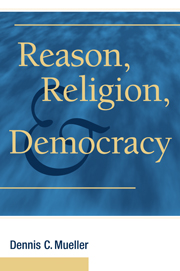Book contents
- Frontmatter
- Contents
- Preface
- 1 Liberal Democracy
- PART I FUNDAMENTALS: EVOLUTION, PSYCHOLOGY, REASONING, AND RELIGION
- PART II A HISTORICAL LOOK AT THE STATE, DEMOCRACY, AND RELIGION
- 4 The First States
- 5 Athens and Rome
- 6 The Caliphate
- 7 The Renaissance
- 8 The Enlightenment
- 9 Religion and Democracy After the French Revolution
- Epilogue to Part Two
- PART III THE INSTITUTIONS OF LIBERAL DEMOCRACY
- PART IV CHALLENGES TO LIBERAL DEMOCRACY
- References
- Author Index
- Subject Index
5 - Athens and Rome
Published online by Cambridge University Press: 05 June 2012
- Frontmatter
- Contents
- Preface
- 1 Liberal Democracy
- PART I FUNDAMENTALS: EVOLUTION, PSYCHOLOGY, REASONING, AND RELIGION
- PART II A HISTORICAL LOOK AT THE STATE, DEMOCRACY, AND RELIGION
- 4 The First States
- 5 Athens and Rome
- 6 The Caliphate
- 7 The Renaissance
- 8 The Enlightenment
- 9 Religion and Democracy After the French Revolution
- Epilogue to Part Two
- PART III THE INSTITUTIONS OF LIBERAL DEMOCRACY
- PART IV CHALLENGES TO LIBERAL DEMOCRACY
- References
- Author Index
- Subject Index
Summary
The only good is knowledge and the only evil is ignorance.
(Socrates)We are lovers of beauty without extravagance, and lovers of wisdom without unmanliness. Wealth to us is not mere material for vainglory but an opportunity for achievement; and poverty we think is no disgrace to acknowledge but a real degradation to make no effort to overcome. Our citizens attend both to public and private duties, and do not allow absorption in their own various affairs to interfere with their knowledge of the city's. We differ from other states in regarding the man who holds aloof from public life not as “quiet” but as useless; we decide or debate, carefully and in person, all matters of policy, holding, not that words and deeds go ill together, but that acts are foredoomed to failure when undertaken undiscussed. For we are noted for being at once most adventurous in action and most reflective beforehand.
(Pericles as presented in Thucydides, 1943, p. 113)Starting about 800 bce, a society emerged around the Aegean Sea unlike any before it, a society that “had a totally new conception of what human life was for, and showed for the first time what the human mind was for.” It organized itself into city-states, but except for their territoriality, they bore no resemblance to the city-states of Mesopotamia. They were democratic to a degree unknown until that time and almost unknown since. As such, they contain important lessons for every student of democracy.
- Type
- Chapter
- Information
- Reason, Religion, and Democracy , pp. 93 - 115Publisher: Cambridge University PressPrint publication year: 2009

